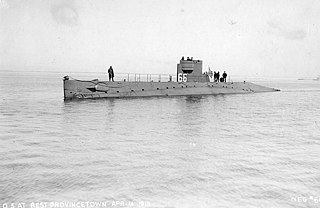
USS O-5 (SS-66) was one of 16 O-class submarines built for the United States Navy during World War I.

USS Sellers (DDG-11) was a Charles F. Adams-class guided-missile destroyer built for the United States Navy in the 1950s.
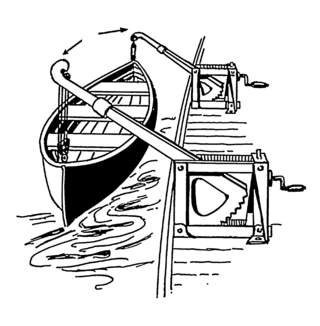
A davit is any of various crane-like devices used on a ship for supporting, raising, and lowering equipment such as boats and anchors.

USS Grapple (ARS-53) is a Safeguard-class rescue and salvage ship in the United States Navy. Her home port is Norfolk, Virginia. On 13 July 2006 Grapple was decommissioned from US Navy service and converted to civilian operation by Military Sealift Command. She was redesignated as USNS Grapple.

A United States Navy diver refers to a service personnel that may be a restricted fleet line officer, civil engineer corps (CEC) officer, Medical Corps officer, or an enlisted who is qualified in underwater diving and salvage. Navy divers serve with fleet diving detachments and in research and development. Some of the mission areas of the Navy diver include: marine salvage, harbor clearance, underwater ship husbandry and repair, submarine rescue, saturation diving, experimental diving, underwater construction and welding, as well as serving as technical experts to the Navy SEALs, Marine Corps, and Navy EOD diving commands.

USNS Salvor (T-ARS-52) is a Safeguard-class rescue and salvage ship, the second United States Navy ship of that name.

Sakawa (酒匂) was the last of four Agano-class light cruisers built for the Imperial Japanese Navy (IJN) during World War II. Fuel shortages crippled the IJN's operations by the time the ship was completed in late 1944 and she never left Japanese waters. After the war, Sakawa was used to ferry Japanese troops home until she was selected in early 1946 to be expended for nuclear weapon tests during Operation Crossroads. The ship was used as a target during the first bomb test on 1 July and sank the following day.
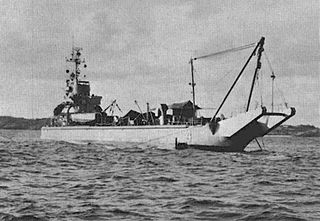
USS Windlass, a Gypsy-class salvage lifting vessel of the United States Navy, was originally conceived as LSM-552 and laid down on 27 August 1945 at Houston, Texas, by Brown Shipbuilding Corporation. Launched on 7 December 1945; and commissioned on 9 April 1946 in Houston at the Tennessee Coal and Iron Docks.

USNS Safeguard (T-ARS-50), formerly USS Safeguard (ARS-50), is the lead ship of her class and the second United States Navy ship of that name.

USNS Apache (T-ATF-172) was a U.S. Navy Powhatan-class fleet ocean tugboat that was operated by the Military Sealift Command (MSC) from 1981 to 2022. She spent the bulk of her career in the Atlantic and Mediterranean.
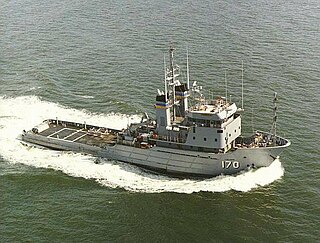
USNS Mohawk (T-ATF-170) was a United States Navy Powhatan-class tugboat operated by the Military Sealift Command from 1980 to 2005.
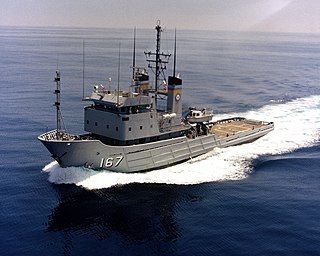
USNS Narragansett (T-ATF-167) is a Powhatan-class fleet ocean tugboat of the US Navy. She was launched in 1979 and inactivated in 1999, but has since been employed in a number of roles. She is still in service as of 2023 as a training support vessel for Carrier Strike Group 4.
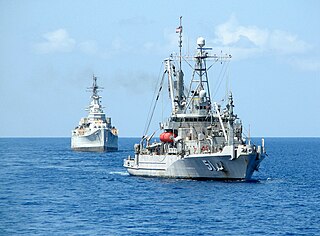
USNS Grasp (T-ARS-51) is a Safeguard-class rescue and salvage ship, the second United States Navy ship of that name.

The USS Missouri grounding occurred 17 January 1950 when the battleship USS Missouri (BB-63) ran aground while sailing out of Chesapeake Bay. No one was injured, but the battleship remained stuck for over two weeks before being freed from the sand. The ship was so damaged that she had to return to port and enter dry dock for repairs.

USNS Navajo (T-ATF-169) was a United States Navy Powhatan-class tugboat operated by the Military Sealift Command which was in service from 1980 to 2016. She spent the bulk of her career in the Pacific and is currently moored in Pearl Harbor, awaiting disposal.

USNS Sioux (T-ATF-171) was a United States Navy Powhatan-class tugboat operated by the Military Sealift Command (MSC). She was in service from 1981 to 2021 and spent the bulk of this time supporting the Pacific Fleet.

The Powhatan class of fleet ocean tugs consists of seven ships built for the United States Navy, and operated by the Military Sealift Command (MSC). The lead ship of the class was launched in 1978 and the last ship in MSC service will be deactivated in 2023. During their service life, the Powhatan's were the most powerful tugs owned by the Navy.

Parbuckle salvage, or parbuckling, is the righting of a sunken vessel using rotational leverage. A common operation with smaller watercraft, parbuckling is also employed to right large vessels. In 1943, the USS Oklahoma was rotated nearly 180 degrees to upright after being sunk in the attack on Pearl Harbor, and the Italian cruise ship Costa Concordia was successfully parbuckled off the west coast of Italy in September 2013, the largest salvage operation of that kind to date.

The Bolster class were a series of rescue and salvage ships designed and built for the United States Navy during World War II. Rescue and salvage ships such as the Bolster class save battle-damaged combat ships from further damage and tow them to safety. Rescue, salvage and towing ships provide rapid fire fighting, pumping, battle damage repair and rescue towing to warships in combat and tow them to repair ships or bases in safe areas.

The Safeguard class is a class of Towing, Salvage and Rescue Ship under the United States Navy.





















